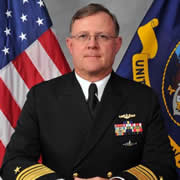3 Star Navy Admiral Relived Of Command Following Gambling Scandal
 Until last week, Tim Giardina was a well-respected member of the United States Navy—a 3-star Admiral, in fact, and the second-in-command officer in charge of America’s nuclear forces. This high-ranking deputy was relieved of duty last week, however, amidst military investigation into his alleged use of counterfeit chips at an Iowa casino.
Until last week, Tim Giardina was a well-respected member of the United States Navy—a 3-star Admiral, in fact, and the second-in-command officer in charge of America’s nuclear forces. This high-ranking deputy was relieved of duty last week, however, amidst military investigation into his alleged use of counterfeit chips at an Iowa casino.
If this doesn’t quite sound like the kind of military disbarment that happens every day, well, it isn’t. The move is so unusual that an Associated Press story calls it “perhaps unprecedented” in the entire history of U.S. Strategic Command, the organization responsible for the country’s nuclear-armed subs, bombers, and missiles.
Giardina held his deputy position since 2011, and his military days are not necessarily over just yet. According to reports, Giardina is being reassigned to a Navy staff position, which will depend on the outcome of the ongoing investigation. Because he was relieved of his post, however, Giardina has fallen in rank to two-star admiral status.
Though the allegations of misconduct are not new, the decision to relieve Giardina of his duty was only made on October 3. The report notes that this big step required the approval of the President of the United States himself, acting under the advisement of Defense Secretary Chuck Hagel.
The problem, according to the Associated Press report, stems from allegations made by Iowa state officials. Their claim is that Giardina used $1,500 in counterfeit chips when he was gambling at the Horseshoe Casino in Council Bluffs, Iowa—not far from the Omaha headquarters of Strategic Command. As of yet, however, Giardina has not actually been charged with a crime.
As for the man’s naval career, he is a career submarine officer. Giardina commanded Submarine Squadron 17 in Bangor, Washington; this suit includes 10 nuclear-armed subs, and was under Giardina’s command from 2001 through 2003. He previously graduated from the U.S. Naval Academy in 1979.
This case simply goes to show that—for as lax as many states have become in their attitudes toward legal online gambling—there remain plenty of ways in which gamers can land themselves in trouble. Those seeking to gamble, either online or off, are strongly encouraged to know the particular online gambling laws of their given states.